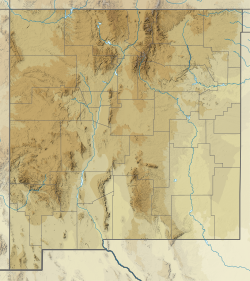Baldy Hill Formation
| Baldy Hill Formation | |
|---|---|
| Stratigraphic range: | |
| Type | Formation |
| Unit of | Dockum Group |
| Underlies | Travesser Formation |
| Thickness | Over 35 meters (115 ft) |
| Lithology | |
| Primary | Mudstone |
| Other | Sandstone |
| Location | |
| Coordinates | 36°58′15″N 103°28′10″W / 36.9708847°N 103.4694368°W |
| Region | New Mexico Oklahoma |
| Country | United States |
| Type section | |
| Named for | Baldy Hill |
| Named by | Baldwin and Muehlberger |
| Year defined | 1959 |
The Baldy Hill Formation is a geologic formation in northeastern New Mexico and western Oklahoma. It preserves fossils dating back to the late Triassic period.[1]
Description
[edit]The Baldy Hill Formation is a dark purple, reddish brown, or greenish gray silty to sandy mudstone with some fine-grained sandstone. Its base is not exposed at the type section, but it is at least 35 meters (115 ft). It is overlain by the Travesser Formation, with the contact marked by the Cobert Canyon Sandstone Bed, a persistent layer of conglomerate beds[1] now assigned to the Baldy Hill Formation[2] or possibly the overlying Travesser Formation (which in turn is sometimes regarded as equivalent to the Chinle Formation.)[3]
The formation may correlate with either the Garita Creek Formation or the Los Esteros Member of the Santa Rosa Formation.[4]
Fossils
[edit]Fossils of amphibians and phytosaurs of Carnian to Norian age have been found in the Cobert Canyon Sandstone.[2]
History of investigation
[edit]The formation was first named by Baldwin and Muehlberger in 1959, for exposures around Baldy Hill in the valley of the Dry Cimarron.[5]
See also
[edit]References
[edit]- ^ a b Ziegler, Kate E.; Ramos, Frank C.; Zimmerer, Matthew J. (2019). "Geology of Northeastern New Mexico, union and Colfax Counties, New Mexico: A Geologic Summary" (PDF). New Mexico Geological Society Field Conference Series. 70 (4): 47–54. Retrieved 1 September 2020.
- ^ a b Lucas, S.G.; Hunt, A.P.; Hayden, S.N. (1987). "The Triassic System in the Dry Cimarron Valley, New Mexico, Colorado, and Oklahoma" (PDF). New Mexico Geological Society Field Conference Guidebook. 38: 97–117. Retrieved 17 September 2020.
- ^ Heckert, A.B.; Lucas, S.G. (2015). "Triassic vertebrate paleontology in New Mexico". New Mexico Museum of Natural History and Science Bulletin. 68: 77–96. Retrieved 3 November 2021.
- ^ Lucas, S.G.; Hunt, A.P.; Huber, P. (1990). "Triassic stratigraphy in the Sangre de Cristo Mountains, New Mexico" (PDF). New Mexico Geological Society Field Conference Guidebook. 41: 305–318. Retrieved 3 November 2021.
- ^ Baldwin, Brewster; Muehlberger, W.R. (1959). "Geologic studies of Union County, New Mexico" (PDF). New Mexico Bureau of Mines and Mineral Resources Bulletin. 63 (2). Retrieved 1 September 2020.


